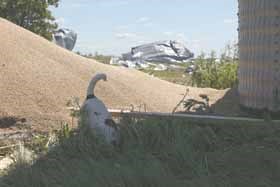"We still can't make up our minds whether it was a plow wind or a tornado," says Siegert Wenning, sitting in the kitchen that overlooks his ruined farmyard. "I said I can't see how it makes a difference anyway-it's all gone."
Reports of damage were widespread in the aftermath of the storm system that shook much of Saskatchewan on the night of June 26, but few people saw destruction on the scale that Wenning and his family are now coping with.
The farmyard, the base of a 5,000-acre operation that Wenning runs with his 20-year-old son Harold, was virtually wiped out by the wind that night.
Shortly after 10 pm, the Wennings and some guests were at home celebrating Harold's 20th birthday when the storm hit: first rain, then hail, then an ominous rumble. When the power went out and the pantry doors began to shake, the group headed to the basement for shelter.
Nothing could be heard outside but the steady rumble, the wind, and the rain. The storm began to ease up within half an hour, and the party returned upstairs.
With the lights still out, the family could only catch glimpses of the yard through the rain during lightning flashes.
"We were sitting in the kitchen when my son suddenly said, 'I see the semi,'" recounts Wenning. "I said, 'How do you mean? The semi's in the quonset.' He said, 'That's what I mean. I see the semi.'"
The quonset was gone, and the equipment inside it exposed to the sky.
When the storm died down, the family took in the full extent of the damage. Not one, but both quonsets were obliterated, along with 120,000 bushels of grain storage. The larger bins were caved in by the force of the wind, while smaller bins were ripped off their foundations and blown half a mile into the field.
Nearly every piece of machinery on the property took damage, as well. Windows were smashed across the yard and sheets of aluminum were tangled like plastic bags around implements. The seed cleaning equipment from the Wennings' sideline business was wiped out.
"The entire yard was gone. Nothing left," says Wenning.
The only major structures left intact were the house and the shop, both of which suffered mostly superficial damage.
The impact of the storm was highly localized; the Wennings' neighbors experienced only minor losses.
After seeing the scope of the destruction, Wenning is "amazed" the house survived. Most of the trees in the windbreak along the house's west side snapped under the assault.
"I think if the shelterbelt would not have been there, [the house] would have been just like the quonsets and everything. Everything would have been gone, and I think we with it."
The Wennings, who moved to Canada from Holland six years ago, now face the task of rebuilding their entire operation while still somehow bringing in this year's crop.
At the moment, Wenning has no idea how the job can be done, but he and Harold are taking it a step at a time in the midst of the cleanup, starting with acquiring a tractor to use for spraying the crops.
"We've got harvest coming up, so we have to work around that. We just have to rebuild everything."




